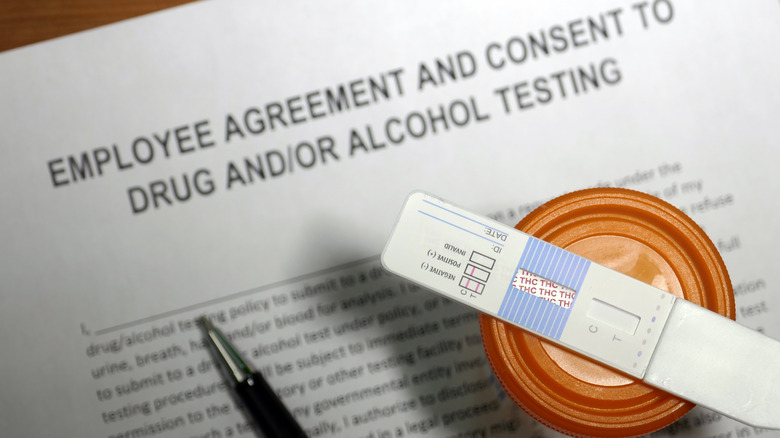How Long Does Marijuana Actually Stay In Your Body's System? Here's What We Know
In the 24 states (plus Washington, D.C.) where marijuana is legal for recreational use, the potency of cannabis can vary, potentially leading to different effects on your body. Some legal cannabis products can have 90% or more THC (the chemical that gives you the psychoactive effect) compared to the 1.5% THC when the drug was illegal (per KFF Health News).
Along with the "high" often attributed to consuming marijuana, mood changes, memory problems, and a shift in sense perception. Taking higher concentrations of cannabis can lead to hallucinations or delusions. But how long do these effects occur?
In an exclusive interview with Health Digest, Medical Marijuana Doctors Megan Horsham and Desiree Granados from Sanctuary Wellness Institute say the effects of marijuana can depend on the individual. "Typically, effects are evident immediately after smoking marijuana," Granados said. "However, it may take one to three hours for effects to become evident when cannabis is ingested. In general, short-term effects of marijuana start disappearing after one to three hours of their peak."
Horsham added that it can also depend on how the drug is consumed. "Vaping and smoking can cause effects for one to four hours," she said. "Anything oral or edible can be 10 to 12 hours. Sublingual four to six hours."
Marijuana can stay in your system for more than a month
When you consume marijuana, your tissues and organs take up the THC. After the initial high is over, your liver goes to work to detox the drug. You'll poop out 65% of the THC, and 20% comes out in your urine, according to American Addiction Centers. The remaining THC stays in your tissues but eventually gets metabolized by your liver. That's why you can test positive on a drug test long after you consume cannabis.
Granados said that multiple factors such as your body size, how often you use marijuana, and the strength of the drug can affect how long it can be detectable in your system. Marijuana affects men and women differently, and the type of drug test can also make a difference. "For example, cannabis can be detectable in urine (most commonly used test) from three days after a single use to over a month in heavy frequent users," she said.
Long-term effects of marijuana use
Marijuana might not be detectable in your system for longer than a month, but smoking marijuana every day could have some long-term health consequences. A 2022 statement from the American Heart Association published in Stroke said that cannabis can disrupt natural processes in the brain such as learning and neurotransmitter release. Some observational studies have linked marijuana use with cognitive impairment, high blood pressure, heart attack, and diseases of the blood vessels in the brain. The National Institutes of Health says marijuana's effect on the brain can be particularly problematic for adolescents and teenagers because their brains are still developing.
Long-term use of cannabis might also affect your risk of some types of cancer. A 2019 article in JAMA Network Open found that using marijuana for more than 10 years increased the risk of testicular cancer. Interestingly, long-term use of cannabis might reduce your risk of breast cancer, according to a 2024 article in Wiener Klinische Wochenschrift. However, cannabis use disorder increases your risk of both breast cancer and lung cancer.


